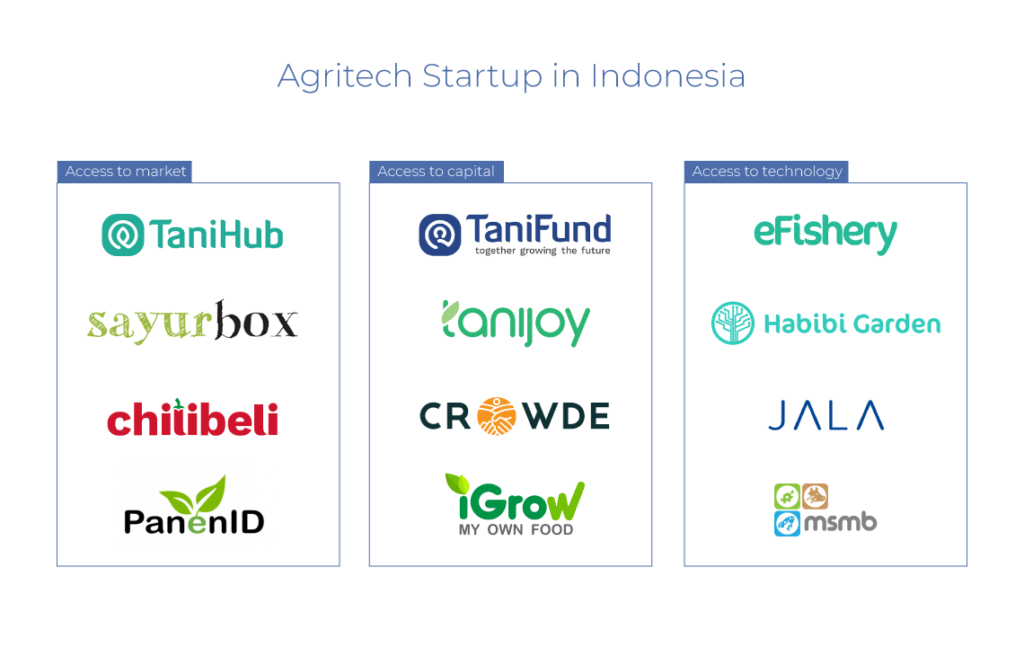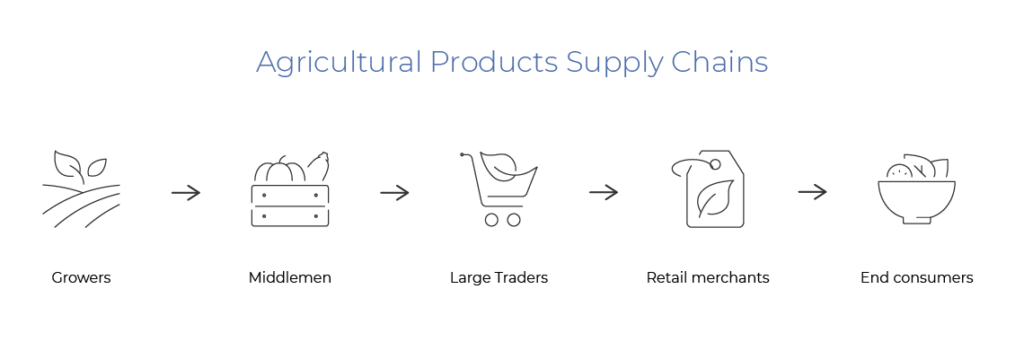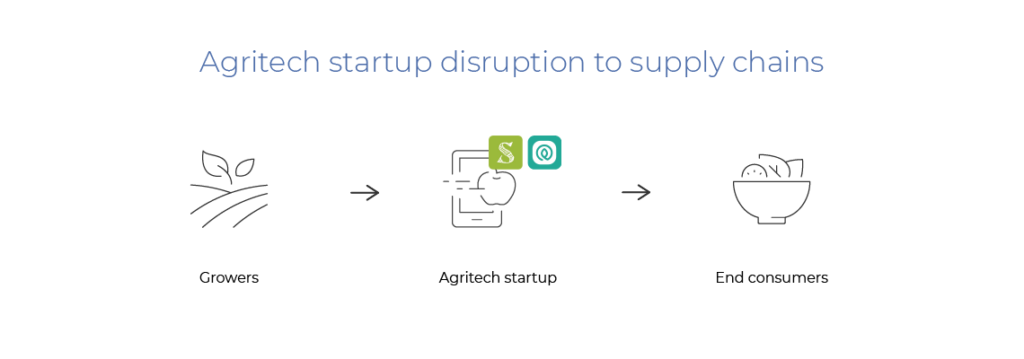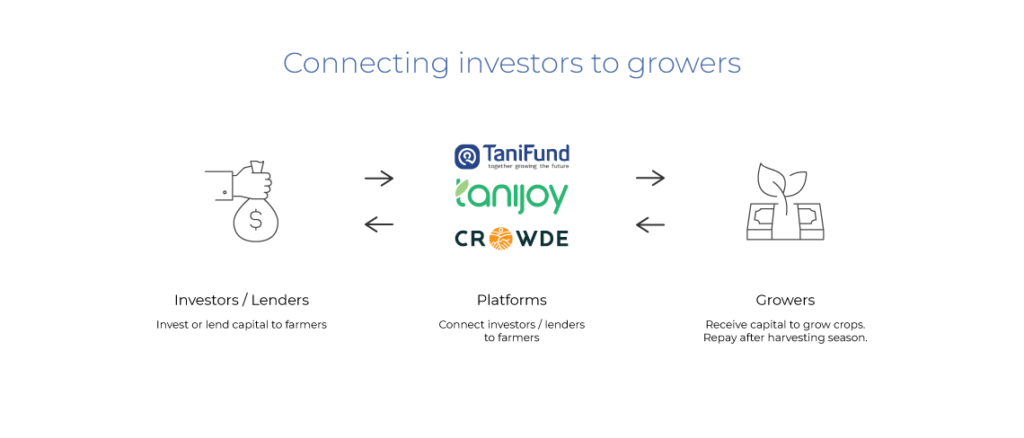Indonesia has been known as an agrarian country for hundreds of years, even before its independence. Fast forward to the 2010s, Indonesian agricultural production is under threat. A combination of factors such as land scarcity, limited access to capital and volatile market prices has discouraged Indonesian youth to pursue farming. According to the Central Bureau of Statistics, the number of farmers in the country dropped from 35,7 million in 2018 to 33,4 million in 2020.
Addressing such a crisis, Indonesia’s startup scene began to take action. Various agritech startups such as TaniHub, SayurBox and Tanijoy were founded to provide innovative solutions targeted to solve key problems in the agricultural sector.

Access to market
One of the biggest challenges for Indonesian farmers is to gain access to the market. Due to the archipelagic nature of the country, it is almost impossible for farmers to transport their goods and market them to end-consumers directly. Agricultural product supply chains typically involve several layers of intermediaries before it finally reaches the end consumers.

Farmers would typically sell their products to tengkulak, Bahasa Indonesia for middlemen, who will then transport them to different cities and sell them to the large central markets, which are called pasar induk in Indonesia. Retail merchants, typically smaller traders, would purchase the products from the large traders in bulk before finally it reaches the consumers.
These complicated trade routes involving a large number of middlemen results in inefficiencies, where products are sold at a high price for end consumers, while the actual growers receive only a small percentage of said prices.
Agritech startups like TaniHub and SayurBox aim to cut out the middlemen in agricultural product supply chains, connecting growers with the end consumers via smartphone apps. By cutting out the middlemen, these agritech startups help farmers gain more income, while also reducing prices for end consumers.

While TaniHub and SayurBox operate on the B2C markets, other startups like Panen ID and Chilibeli’s Chilimart explored the B2B markets, facilitating direct trade to hotels and restaurants.
Access to capital
Farmers typically face a difficult time when trying to get access to capital. On one hand, farmers often struggle to get financing from banks, which offer low-interest rates, as they often lack the collateral to access bank loans and find the administrative process to be complicated.
On the other hand, while alternative financial institutions are rising, they often lack the products that suit farmers’ needs, especially when it comes to repayments. Unlike other sectors, the agricultural sector gains profit on a seasonal basis. Monthly repayment does not match farmer’s harvesting season.
To address this gap, some agritech startups include an element of fintech in their products. For instance, TaniHub, the agritech marketplace we previously mentioned, also launched TaniFund, a P2P lending fintech, which allows users to pick a farmer to lend money to and get relatively high returns. Aside from TaniFund, there are a number of other startups operating in this space, such as Crowde, iGrow, TaniJoy among others.

Access to technology
Innovation in farming internet of things (IoT) has also come up in recent years. The advancement in technology equipped farmers with the tools to automate and standardize farming practices.
Habibi Garden’s product, HabibiGrow, allows farmers to water plants and control greenhouses automatically and remotely. MSMB developed a variety of tools such as drone sprayer, drone surveillance and soil and weather sensor.
Beyond farming, such technologies are also developed for fisheries. eFishery for example, provides smart fish feeding solutions. It detects fish’s appetite through motion sensors and feeds them automatically. Another startup, Jala, built a device to monitor water conditioning in shrimp farms.
Opportunities wide open for new innovation
Despite the presence of all the brands mentioned above, there are opportunities in the agriculture space that are yet to be explored. Unlike other sectors where one size fits all solutions are applicable, the agriculture sector needs specifically tailored solutions. For instance, IoT technologies to water paddy fields might not be applicable for maize. Hence, it is up to the innovators to tap into the different segments.
It is also worth noting that agricultural solutions are hyper localized. Just because the marketplace lives online, does not mean that its operation could too. There are various operational hassles such as logistics, transportation, monitoring and many more that it is impossible to handle remotely. Therefore, the space, especially in the rural part of Indonesia, is wide open for businesses to establish hyper local agriculture products marketplaces.
How Xendit can help
Interested in creating your own innovation in the agriculture space? Xendit can help you establish the payments infrastructure you need, so you can focus on building the right products for your customers.
Achieve operational efficiency with Xendit’s complete payment platform. Accept payment from end customers, send money to your suppliers and generate reports for your analysis. Whichever monetization strategy you choose, Xendit is here to help.
About Xendit
Xendit is a financial technology company that provides payment solutions and simplifies the payment process for businesses in Indonesia, the Philippines and Southeast Asia, from SMEs and e-commerce startups to large enterprises. Amidst the fragmented payment landscape in Southeast Asia, Xendit enables businesses to accept payments from direct debit, virtual accounts, credit and debit cards, eWallets, retail outlets, and online installments
For many businesses, accepting payments online is new territory, but we’re here to help. We have helped 1000s of businesses come online and we’d love to help you too.
Find out more about Xendit, or sign up to try our dashboard!












